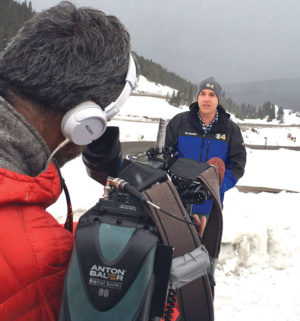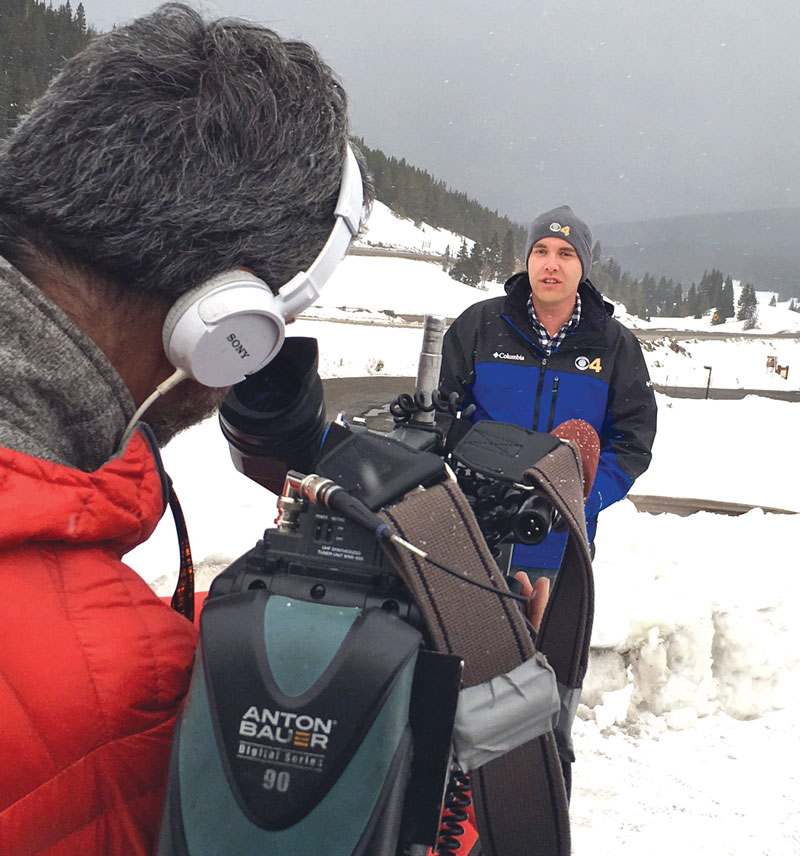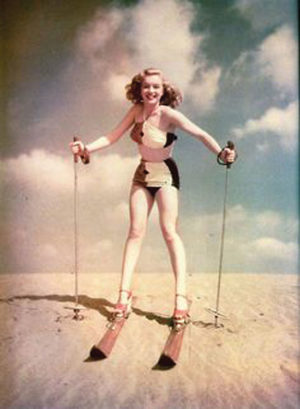Matt Kroschel is the mountain news reporter with KCNC-TV (CBS4) in Denver. He grew up in Poncha Springs and is a graduate of Salida High School, class of 2007.
CC: At what point in your upbringing did you decide you wanted to go into television journalism?
MK: I can’t remember exactly when, but I know I was young. I used to watch the Denver news every evening with my parents and for some reason, just knew I wanted to do that some day.
CC: Could you describe the road to your current job?
MK: My journey to getting paid to talk on TV started professionally at the [Salida] Mountain Mail with a paid (very rare) summer internship my junior year. That turned into a real, paid gig taking photographs and writing for the paper. I headed to Mesa State College in Grand Junction to major in mass communications. I worked for the college as a photographer, was an editor for the school paper (paid gig) and interned at the NBC TV station in Grand Junction. My big break came my senior year of college – I was hired full time as a reporter and anchor at the CBS station in Junction. Finished up school while getting on-the-job training on TV every evening. From there, the call to Huntsville, Alabama, to work at the CBS station there and, before I knew it, CBS Denver called and wanted to bring me home.
 CC: What is your “beat?” Do you cover the entire state?
CC: What is your “beat?” Do you cover the entire state?
MK: I’m the mountain reporter. Our team focuses on covering the mountains, Western Slope and everywhere in between. We cover breaking news, feel- good stories and issues facing mountain folks. We are based out of Summit County.
CC: What is the most challenging aspect of your job?
MK: Hardest thing is keeping track of all the different ongoing stories impacting the different communities we are responsible for covering. Keeping those important relationships with folks who live there.
CC: Do you often find your own leads or are you mostly assigned stories?
MK: I love beating the competition to stories and I’m fortunate that a lot of people trust my reporting and send me really good story leads and tips. Majority of what we do on TV comes from our own enterprising, but we do rely on the small town newspapers to find stories sometimes. I kind of recap what’s making news in this region and my producers decide what they want us to cover day to day from that list.
CC: Do you feel coming from a small Colorado town, you bring a hometown perspective to your reporting?
MK: It helps. To understand those issues small towns face and to know how life works gives me a leg up on the city reporters almost every time. Knowing so many people across the state also proves invaluable when it comes to finding people to interview.
CC: Do you see a difference with how members of small communities work together in times of need versus urban dwellers?
MK: Time and time again. Nothing against folks that call the city home, but there is something extra special about small town living. Seems like no matter where bad things happen though, Coloradans come together to get through it. It’s amazing the spirit and the commitment to our neighbors.
CC: What has been your most challenging assignment?
MK: We have been assigned to some very emotionally draining and sad murder trials. Also wildfires can be so devastating to cover because you feel helpless to do anything for the people impacted.
CC: How about the most curious or comical?
MK: As a kid journalist, one Sunday morning, driving around out by the Arkansas River, I spotted what I swore were seven or eight swans in a pond. No one believed me until we sent my photos over to the Denver Zoo. They confirmed they were in fact, swans. First confirmed sighting of them in Chaffee County. They listed my discovery in the annual National Audubon records! It was one of my first full front page photos and story!
CC: Considering the current level of attack on journalists, how are you generally received in the public’s eye?
MK: We hear it a lot, “fake news.” I figure most people don’t realize the difference between national cable news outlets and us local reporters busting our butts to get the story right. It makes you have tough skin, but every time my story helps someone or brings awareness to a major issue I am reminded why I have the best job in the world.
CC: How long have you been with CBS Denver?
MK: Coming up on four years!
CC: Do people recognize you on the street when you are not working?
MK: It always happens when I’m running a quick errand in my workout clothes and wearing a ball cap. I enjoy meeting the people who watch us! A lot of them follow along with my social media platforms like Facebook and Twitter and they have very detailed memories about my cats and dogs, the chickens that I post a lot of pictures of. Always makes me smile to know how much people care. The most random place I have been recognized was on vacation on a scenic train ride with my family. A worker came into our car and called out my name. I stood up and she said her cousin was a huge fan and demanded she take a selfie with me. I had posted a pic with the train a few minutes before that, gave away my location.
CC: Do you hope to move on to a national news organization someday?
MK: Working at CBS4 was always my dream job. It’s the best job in television and I don’t plan on going to that level – way too much travel to tragedies for my liking. Plus I like to spend as much time on our little homestead with my fiancée and pets as possible!
CC: Any thoughts on the future of television news broadcasting?
MK: There are and have been major shifts happening in news. The number of people watching the news is decreasing and is segmented. It forces us to be better at what we do everyday. We must stand out for our quality and ability to tell good stories. That need for journalism will never go away.
CC: Thank you, Matt!


